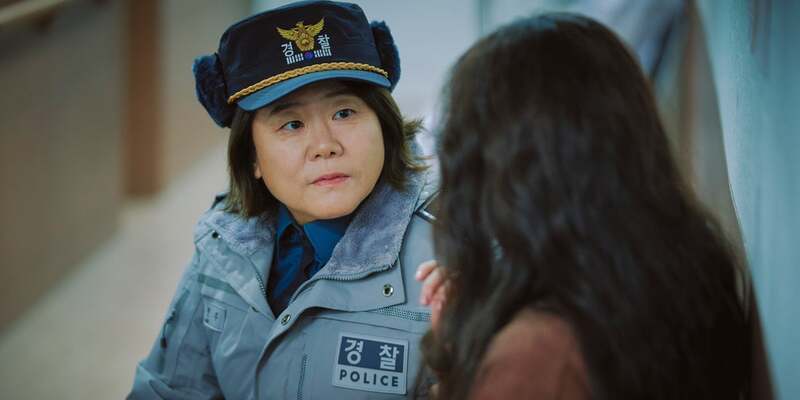
Review by
Eric Hillis
Directed by: Christine Ko
Starring: Jung Ryeo-won, Lee Jung-eon, Jang Jin-hee, Kang
Jung-woo, Kim Jung-min

With its middle-aged smalltown female cop tackling a crime she's
unprepared for and its snowy backdrop, Christine Ko's
The Woman in the White Car has drawn
Fargo comparisons from film festival programmers. A more
apt comparison might be Scandinavia's Nordic Noir movement, as it plays
its drama straight (for the most part - there's one decidedly odd comic
moment in an otherwise stoic film) and often resembles a pilot episode
for the sort of Scandinavian TV shows that have become global cult hits
over the past decade.

The Marge Gunderson comparisons come via the figure of middle-aged
smalltown cop Hyun-ju (Parasite's Lee Jeong-eun). Years of protecting and serving her sleepy
community have led to Hyun-ju losing her passion for her job. When she
receives a call about two injured sisters arriving at the local
hospital, she's completely unprepared for what follows.
At the hospital, Hyun-ju finds Do-kyeong (Jung Ryeo-won), who
has some minor scars, and another comatose stabbing victim (Kim Jung-min) who Do-kyeong claims is her older sister. Interrogated by Hyun-ju,
Do-kyeong tells the story of how her sister arrived at her home with her
sinister new fiancé (Kang Jung-woo) in tow. Her
brother-in-law-to-be turned out to be a violent domestic abuser, with
the night ending in his death as the two sisters defended themselves.
Sure enough, Hyun-ju finds the body, but certain aspects of Do-kyeong's
story don't quite add up.

As Hyun-ju investigates further, the movie takes a
Rashomon approach to teasing out the true details of what
really happened on that fateful night. Some of the reconstructions are
from the people involved, who may be lying to cover up the truth and
save themselves, while at times the film presents its own objective
truth. Or does it? Director Christine Ko and screenwriter
Ja-Yeon Seo take aspects from various Hitchcock thrillers (it
ultimately hinges on an idea lifted from one particular movie that I
can't name without giving the game away), including the unreliable
narrator technique of Stage Fright. We're never sure if we can trust any of the characters, or even the
film itself. Watching the movie at home on a screener, I had the luxury
of being able to rewind and replay certain scenes, but cinema audiences
will want to ingest plenty of coffee before their screening so they can
mentally keep up with the film's multiple twists and turns.
Of course, Hitchcock always favoured suspense over mystery and
surprises, giving the audience more information than the protagonist to
create those crucial "he's behind you, don’t go up the stairs etc"
moments. Ko and Seo take the opposite approach, with the characters
always in possession of more information than the viewer. This means
we're never really engaged with the characters, rather we're watching
them from a distance as they dispense information. I found myself
wondering if the movie might be more effective had the final twist been
revealed to the audience a lot earlier. As it is, we never feel like our
nominal hero Hyun-ju is in any real danger, whereas if we knew the true
nature of what she's up against it might have added some much needed
suspense to the narrative.

It's a mentality I've never personally understood, but there are many
viewers who are quite happy to watch a movie for its surprises (hence
the internet's obsession with avoiding "spoilers"), and they'll be well
served by Ko's film as its narrative is as tangled as the cables behind
your stereo. Whether you favour suspense or surprises, you'll be kept
engaged by the film's two central performances from Jeong-eun and
Ryeo-wun, and if this were a pilot for a TV series, the former certainly
does enough good work to impress the most demanding of network
execs.


